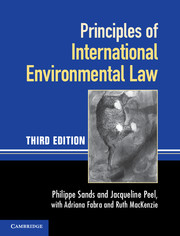Book contents
- Frontmatter
- Contents
- Foreword
- Preface and acknowledgments to the first edition
- Preface and acknowledgments to the second edition
- Preface and acknowledgments to the third edition
- Table of cases
- Table of treaties and other international instruments
- Abbreviations
- Part I The legal and institutional framework
- 1 The environment and international society: issues, concepts and definitions
- 2 History
- 3 Governance: states, international organisations and non-state actors
- 4 International law-making and regulation
- 5 Compliance: implementation, enforcement, dispute settlement
- Part II Principles and rules establishing standards
- Part III Techniques for implementing international principles and rules
- Part IV Linkage of international environmental law and other areas of international law
- Index
- References
5 - Compliance: implementation, enforcement, dispute settlement
from Part I - The legal and institutional framework
Published online by Cambridge University Press: 05 June 2012
- Frontmatter
- Contents
- Foreword
- Preface and acknowledgments to the first edition
- Preface and acknowledgments to the second edition
- Preface and acknowledgments to the third edition
- Table of cases
- Table of treaties and other international instruments
- Abbreviations
- Part I The legal and institutional framework
- 1 The environment and international society: issues, concepts and definitions
- 2 History
- 3 Governance: states, international organisations and non-state actors
- 4 International law-making and regulation
- 5 Compliance: implementation, enforcement, dispute settlement
- Part II Principles and rules establishing standards
- Part III Techniques for implementing international principles and rules
- Part IV Linkage of international environmental law and other areas of international law
- Index
- References
Summary
INTRODUCTION
Ensuring compliance by members of the international community with their international environmental obligations continues to be a matter of serious concern. This is reflected in the attention the issue received at UNCED, in the negotiation and implementation of recent environmental agreements, and in the growing number of environmental disputes brought before international judicial bodies. The relevance of environmental concerns to international peace and security was affirmed by the UN Security Council in January 1992, when its members declared that ‘non-military sources of instability in the . . . ecological fields have become threats to international peace and security’. The response to those concerns has included the development of existing mechanisms for implementation, enforcement and dispute settlement (such as the specialised rules for arbitrating environmental disputes promulgated by the Permanent Court of Arbitration in 2001), as well as new approaches such as the non-compliance mechanisms established under a number of environmental agreements, and the role given to the UN Compensation Commission over environmental claims.
Of the reasons proffered for renewed efforts, at least three are especially relevant. First, it is apparent that states are taking on ever more international environmental commitments, of increasing stringency. Second, the growing demands on access to finite natural resources, such as freshwater and fish, provide fertile conditions for conflicts over the use of natural resources. And, third, as international environmental obligations increasingly intersect with economic interests, states that do not comply with their environmental obligations are perceived to gain unfair competitive advantage from non-compliance. Non-compliance is seen to be important because it limits the effectiveness of legal commitments, undermines the international legal process, and can lead to conflict and instability in the international order. It occurs for different reasons, and it is widely recognised that the underlying causes require further attention so that existing and new international legal obligations are crafted to ensure their effective implementation. At UNCED, attention was focused on mechanisms to prevent disputes and to resolve them peacefully when they arise. Subsequent efforts have reflected a desire to address enforcement and dispute settlement in a non-contentious and non-adversarial manner.
- Type
- Chapter
- Information
- Principles of International Environmental Law , pp. 135 - 184Publisher: Cambridge University PressPrint publication year: 2012



